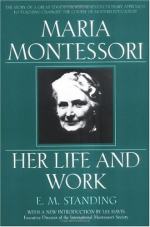
|
| Name: _________________________ | Period: ___________________ |
This quiz consists of 5 multiple choice and 5 short answer questions through Book 4, Part 4 : Chapter 1, XV & XVI: The Fundamental Problem & Prepared Environment.
Multiple Choice Questions
1. According to Montessori, which of the following is not a cause for a deviation?
(a) Failure to create.
(b) Inhibition.
(c) Invasion.
(d) Freedom.
2. Standing uses the expression 'Young Explorer'; what does he state is unique about the young explorer?
(a) He is never idle.
(b) He loses interest easily.
(c) He rarely challenges himself.
(d) He asks many questions.
3. What does Standing compare the universe to when discussing how a child may see it?
(a) A maze.
(b) A straight line.
(c) A jigsaw puzzle.
(d) An illusion.
4. In "The Fundamental Problem & Prepared Environment," what did Montessori say about universal oppression in relation to children?
(a) Children are oppressed only in rich countries.
(b) Children are oppressed world wide.
(c) Children are oppressed only in poor countries.
(d) Children are learning how to fight oppression.
5. According to Standing, what did Froebel call the inner relationships that children look for between things?
(a) Common objects.
(b) Inner connexions.
(c) Innerships.
(d) Cause and effects.
Short Answer Questions
1. In terms of furniture, what does Standing suggest a child prefers in "The Fundamental Problem & Prepared Environment"?
2. At what age do many educational professional (non Montessori) feel children should learn how to read?
3. What is the reason for the difference in number of students per class in the Montessori classroom compared to the traditional classroom?
4. According to Montessori, why is oppression of children strange?
5. According to Standing, what does the inner rhythm of the child represents?
|
This section contains 281 words (approx. 1 page at 300 words per page) |

|




